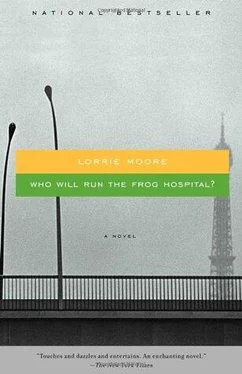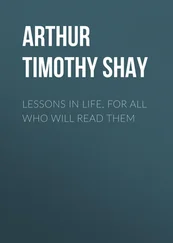“You don’t need that stuff,” she said. “You’re too young.”
“What stuff?” I said, and she sighed and let me go. (Decades later, in my one lone year of Housewife’s Bathrobe Disease, my husband at work but not me, I would roam through the house, still in slippers and a robe, my face unwashed, my hair unbrushed, but I’d put on lipstick, a bright Indian Red or Scarlett O’Hara, and schluff through the house like that, sort through papers, vacuum.) Our mothers let us do this — wear makeup, and stockings and garter belts, and go off — because they had other concerns. Sils’s mother had a job and sons in a rock band. Mine was at a meeting or church or some information fair for foreign students, and at home, when she wasn’t mimeographing committee memos from a metal box of brownish jelly heated on the stove (pages and pages of purple lettering produced this way from a single typed sheet), she was chatting with Mrs. LeBlanc, or curled on the couch beneath a raincoat, napping off a depression. Sils and I would go downstreet and lurk. Look for “cute guys,” we said. Though when we actually came upon a band of them, my heart always sank.
But it was those times mostly that bonded me to Sils, and made me able later to spot the slightest thought working its way across her face, like a bit of weather, and that is how I knew that morning, my mother dropping me off in front of Storyland, and me glimpsing Sils arriving at the same time with Mike, and slipping bowlegged off his bike and scraping her ankle on the hot exhaust pipe, a loss of agility peculiar for her, that she was pregnant. It was the spaciness of her worry, the slight separation both from Mike and from me, whom she seemed to try to reach via quick bolts of light and dark she threw into her eyes and then yanked away, put in storage, her eyes becoming a snowman’s coal. She’d throw, yank, turn away in loneliness. At home in her room she played E-minor 7 to E-major, over and over on her guitar, saying nothing. Then she’d look at me as if I’d only just arrived and say, “What?”
She wasn’t telling me, because she thought I was a child. A child with a cottage cheese sandwich. That’s what I believed she thought. I was sure.
And so that is why, when she finally did tell me, days later—“I can’t believe this, Berie, but I may be pregnant”—I leaped like a hired hand to respond.
“I’ll help you,” I said.
Though some part of me also hung back, shocked and disbelieving, unable to proceed through the moment, the information. No matter that you anticipate a thing; you get so used to it as part of the future that its actuality, its arrival, its force and presence, startles you, takes you by surprise, as would a ghost suddenly appearing in the room wearing familiar perfume and boots. We were in the Storyland employees’ lounge, getting dressed, she as Cinderella, me as my usual striped goof in a pinafore and hat.
“It might not be true,” she said. “I feel so bloated. I feel like I’m going to get my period any day now.”
“That’s one of the signs,” I said knowledgeably. I read all the books, fascinated with gynecology the way an android might be.
“When Chrissy Messita was pregnant she had to go to Vermont.”
“I’ll drive you,” I said. I only had my learner’s permit, but I was getting good.
“I suppose I can get Mike to drive. But thanks.”
I was quiet, thinking about her and Mike Suprenante and what their baby might look like.
“What car would you get, anyway?” she asked.
“What?”
“Whose car would you be able to g—”
“My parents’,” I said quickly. I was too young myself for a driver’s license, but I thought what I could do was get LaRoue to drive us. “I could wait and catch them on a nice day, when they walk everywhere anyway and wouldn’t miss the car.”
“I don’t think it works like that,” she said. She leaned over and placed her breasts in the bodice of the dress, cakes in a cup, and then she turned around for me to zipper her. “You have to make an appointment and go when the appointment is.”
It was then that I realized she meant the abortion clinic, not the unwed mothers’ home. Last year two pregnant girls we knew from school — Mary Mills and Sara Hayward — had gone to the home to live for four months to have their babies, and Mary Mills, afterward, had serrated her arms with a grapefruit spoon. Abortion was newly legal in the state, but in our county no doctor would perform one; you had to go to Vermont.
“Oh,” I said, “that’s right.” The tinny calliope music started up in the park, and I grabbed my cashier’s box, the one with the money and the thick roll of orange tickets, and headed for register three upstairs, to empty the box into the drawer.
“Tonight,” Sils called after me. “Don’t forget.”
“Okey dokes, artichokes.” I actually said that. When I was fifteen I actually said that a lot.
I phoned my mother late in the afternoon to say I wouldn’t be home for dinner; I got LaRoue instead. She was working at a kennel that summer, cleaning dog cages, and grooming cats, which no one there liked to do except her. “I don’t know,” she said in her strange proprietary way. “I don’t know. Mom won’t be too pleased.” Mom . She always called her that. Now I grew strange and proprietary. “She’ll live,” I said and hung up. I didn’t think about LaRoue, who she was, what she might have wanted in her life or from me, who was not exactly in it, but dancing along at the edge like a bean. I acted fidgety with her, jumpy and busy.
I was focused on Sils. That night after work we walked to Dairy Dreem for cheeseburgers and milk shakes, sitting outside across from the old Fond du Lac Fort, taken by the British from the French in the 1700s, and recently reconstructed for the tourists. Once in a while a fake cannon went off, and a teenager dressed in eighteenth-century British military garb — red coat, black hat, ponytail wig — would bang a drum, his summer job. The Old Paddle Wheel at the marina would whistle off its steam, and set sail on its dinner cruise. Cars would drive slowly on Route 9, looking for something to happen, or else they would rush, on their way to the beach, or to miniature golf, or to spin painting, or beyond to Montreal. Sils and I sat at Dairy Dreem, at the picnic tables, near the trash cans, eating our cheeseburgers and french fries in wax paper and red plastic baskets. We stirred our milk shakes with long, plastic iced tea spoons. We felt anonymous, Alone Together, like the song; we knew every song there ever was.
“I’m probably stalling,” she said, “kidding myself.”
I nodded sympathetically, poured more catsup on the wax paper, like some inadvertent symbol, then quickly mopped it up with my fries. I suddenly felt strange. “How long”—and here I cleared my throat—“how long are you overdue?” I sounded like an embarrassed boy, or a nurse. An embarrassed boy-nurse.
I thought she would say a week. Instead she said, “Two months.”
“Oh,” I said quietly. My grasp of basic syntax palsied. “Shouldn’t you try and better hurry soon?”
Sils let her head fall into one palm. Her hair fell in long lines across her face. “God, I feel sick.” She shoved her food away. “My problem is I guess I just don’t want Mike to know.”
I didn’t say anything.
“All those years at St. Alphonse’s Academy in Albany,” she said. “He’ll want to keep it. He’ll want to get married. I just can’t.”
“You’re too young,” said I, the agreeable sidekick, the Greek chorus of one earnest pip-squeak, though the words were those of my sixth-grade teacher, scolding my lipstick; I’d inadvertently seized them, applied them beyond the lines of my mouth.
Читать дальше












